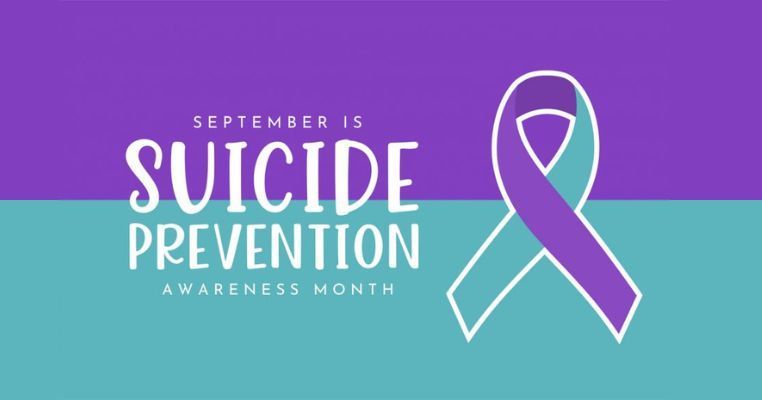Shining Light on National Suicide Prevention Month: Understanding, Support, and Resources

The recognizes September as National Suicide Prevention Month, starting with World Suicide Prevention Day on September 10. The purpose of National Suicide Prevention Month is to raise awareness of suicide as a leading cause of death and to educate the public on how they can contribute to saving lives in their communities.
Suicide is a sensitive subject for many people, and the causes of suicide are many. It often occurs when a person experiences an intense mix of stress and health issues, creating feelings of hopelessness and despair. Conditions like depression, anxiety, and substance abuse problems contribute to the risk of suicide when unaddressed, which is why the treatment and maintaining of mental health is crucial.
Prominent risk factors for suicide include:
- Mental health conditions such as depression, bipolar disorder, and schizophrenia
- Substance use problems
- Personality traits of aggression, mood changes and poor relationships
- Serious physical health conditions including pain
- Traumatic brain injury
- Access to lethal means including firearms and drugs
- Prolonged stress, such as harassment, bullying, relationship problems or unemployment
- Stressful life events, like rejection, divorce, financial crisis, other life transitions or loss
- Exposure to another person’s suicide, or to graphic or sensationalized accounts of suicide
- Previous suicide attempts
- Family history of suicide
- Childhood abuse, neglect or trauma
According to the , 41% of LGBTQ youth have contemplated suicide in the past year. The stigma, lack of acceptance, fear of retaliatory violence after coming out, and shame put gay, lesbian, and trans youth at high risk.
According to Frank Shea, Program Director of BHN's Agawam Counseling Center and liaison to the Pioneer Valley Coalition of Suicide Prevention, there are two types of suicides: impulsive, and planned. Planned suicide is the more well-known type, involving research into methods and making end-of-life arrangements.
One warning sign to look out for is whether a person appears to brighten up at the mention of the topic of suicide. "When that happens, they've already arrived at the solution to the problem in their mind and are waiting to complete it. Be wary of their actions." Impulsive suicides also represent a significant risk, but are usually less likely to be completed, "Impulsive suicide can happen due to overwhelming feelings, such as a bad day" says Shea. "Talking and listening to people is important. Take any comments seriously. Are they talking about their future or not?”
While a single risk factor doesn't guarantee that a person will attempt suicide, it's important to provide help and support. It's also crucial to be aware of warning signs that indicate a person may be suicidal, such as changes in their behavior or what they say. This may include:
- Sharing that they are having
- Thoughts of killing themselves
- Feelings of hopelessness
- Thoughts that that they have no reason to live
- Thoughts that they are a burden to others
- Feelings that they feel trapped
- Expressing unbearable pain
- Increased use of alcohol or drugs
- Looking for a way to end their lives, such as searching online for methods
- Withdrawing from activities/ loss of interest
- Isolating from family and friends
- Sleeping too much or too little
- Visiting or calling people to say goodbye
- Giving away prized possessions
- Displaying aggression, agitation/anger, irritability
- Experiencing fatigue
- Experiencing depression & anxiety
- Humiliation/Shame
- Displaying relief from suffering, or sudden improvement
According to Elizabeth Therien and Hallie-Beth Hollister, program managers for BHN’s Mobile Crisis team, there is a misconception that only people with mental health issues commit suicide. If you are concerned for someone, whether they have a history of mental health challenges or not, don’t be afraid to bring up the topic. “Asking someone about suicide is a tip – it won’t plant the idea. Express concern. Ask if they have a plan. Suicidal ideation can simply be a baseline mood for some people, but things prevent them from acting on it, such as religious faith, or concern for their kids. Take comments seriously and ensure the individual has a support system which can sustain them."
Help is available, and there are many ways to take action. Asking in a caring way and listening to the person without judgment goes a long way to making them feel safe. It also helps to keep lethal means, such as drugs and sharp objects, less available to the person.
If you or a loved one are in crisis, 24/7 resources are available. Call or text 988 to connect to the . Call 413-301-WELL (9355) to connect to BHN's Crisis team for support.
Learn more and find resources:
SHARE
Topics

Newsletter Sign-Up
Sign-up for our newsletter to receive updates on what's happening at BHN.
Ji8������Ƶ, Inc.
417 Liberty Street | Springfield, MA 01104
(413) 301-9355

All Rights Reserved | Ji8������Ƶ, Inc.



